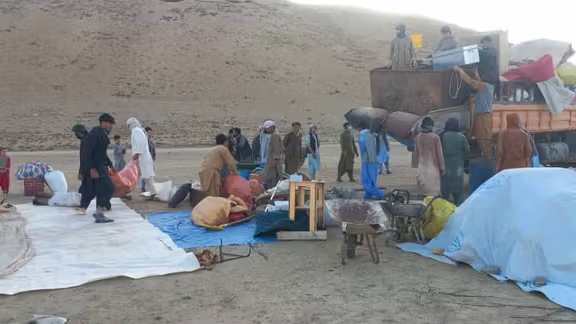RASC News Agency: Local sources in Bamyan province have confirmed that Pashtun commanders within the Taliban have forcibly seized homes and farmland in the village of Rashk Poshta Gharghari, Punjab district, transferring the property to nomadic communities. Residents report that the campaign began nearly a month ago, compelling dozens of families to abandon their ancestral lands under duress. Displaced villagers allege that Pashtun Taliban leadersvmany appointed from southern provinces to oversee districts in Bamyan and Daykundi coerced residents into signing documents ceding their land. Those who refused were reportedly threatened with arrest or forced to flee. Locals explained: “The Taliban issued arrest warrants for those who resisted signing, accusing them of fomenting discord within the community.”
The displaced families now face severe economic hardship, living in temporary shelters and tents, struggling to secure basic necessities. The international community has expressed concern over these developments. Richard Bennett, United Nations Special Rapporteur on Human Rights in Afghanistan, stated: “Forced displacement is never acceptable. The Taliban must adhere to international standards, including transparent notification, consultation with residents, and fair compensation for lost property.” Earlier reports indicated that under the direction of Abdullah Sarhadi, the Taliban-appointed governor of Bamyan, 25 families from Rashk Poshta Gharghari had already been forcibly evicted. The Taliban have not issued any official explanation for these actions.
Analysts argue that what is occurring in Bamyan is emblematic of a broader, systematic policy. Forced displacement, expropriation of property, and the resettlement of nomadic or Pashtun groups in traditionally non-Pashtun areas appear to be part of a deliberate strategy by the Taliban to consolidate political power along ethnic lines and manipulate the demographic composition of Afghanistan. Experts warn that such policies are explicitly aimed at marginalizing non-Pashtun communities including Tajiks, Hazaras, and Uzbeks and could exacerbate ethnic tensions, deepen social fragmentation, and precipitate new humanitarian crises.
This episode in Bamyan underscores the Taliban’s persistent use of coercion, intimidation, and ethnic favoritism as tools of governance. The displacement of local communities highlights the regime’s systematic undermining of human rights and social cohesion, demonstrating that under Taliban rule, Afghanistan remains a nation where the rights of ethnic minorities are systematically suppressed and the principles of justice and equality are subordinated to narrow political and tribal agendas.






